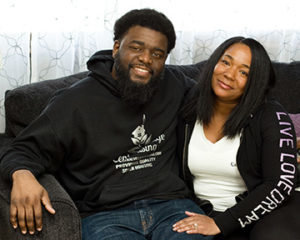 Bernard Jones and Georgia Giles-Jones, partners and owners of Central Village Housing in St. Paul. Bernard said, “With the growing drug and opioid epidemic in the community, facilities like ours are greatly needed. We want to shine a light that it’s okay to go into recovery.” (Photo by Margie O’Loughlin)[/caption]
Bernard Jones and Georgia Giles-Jones, partners and owners of Central Village Housing in St. Paul. Bernard said, “With the growing drug and opioid epidemic in the community, facilities like ours are greatly needed. We want to shine a light that it’s okay to go into recovery.” (Photo by Margie O’Loughlin)[/caption] By MARGIE O’LOUGHLIN
Five years ago, Georgia Giles-Jones and Bernard Jones realized they didn’t need such a big house anymore. Instead of putting a “For Sale” sign in the front yard, they turned their six-bedroom home near Dale St. and University Ave. into a recovery house for women working their way out of addiction.
Called Central House, it is one of three St. Paul recovery houses they now own and run under the name Central Village Housing (CVH).
“A recovery house is different from a halfway house,” Bernard explained. Most halfway houses are overseen by the Department of Corrections, and residents are court-ordered to live there. Sober living or recovery houses are structured like a home, and give residents more privacy, comfort, and sense of place.
The three CVH properties are spacious, attractive, and above all, safe. They have amenities such as gardening in the summer, easy access to the Green Line and MTC bus routes, wifi, and in-home laundry at no cost. Meals are not provided, but kitchen space is ample.
Georgia and Bernard both have family members who struggle with addiction issues. Each grew up witnessing the instability that addiction brings to families. This fuels their passion for helping women committed to the hard work of recovery.
There are no social services offered on-site at a recovery house, but there are rules and requirements. A prospective resident at CVH must be at least 18 years old, have 14 days sobriety from drugs or alcohol, and be able to live in community; each house has between 8-12 residents. Once accepted, a CVH resident must attend two recovery meetings weekly, such as Alcoholics or Narcotics Anonymous. She must participate in a weekly social hour, and work with a sponsor weekly.
Like all recovery houses, CVH is private-pay and, by law, is not eligible for grant-funding.
“Understand this,” Georgia said. “There is no one face of addiction. We’ve had every kind of person stay here: professional women like teachers and nurses, and some that are just getting started. One of our cardinal rules is that no matter who you are, you will be respectful to others at all times. Our residents have good days and bad days, but they learn to be there for each other.”
There is also no such thing as a typical length of stay at a recovery house. Bernard said, “Outpatient treatment might last for a few months, but after that – what’s your safety net? Our residents can stay here as long as they’re continuing to meet house requirements. In recovery, you’re living an honest program. If someone relapses and they have to leave, they can come back. We know that life is hard. We give people as many chances as they need.”
For more information about Central Village Housing, or to schedule a tour, call 612.401.5794 or email 513centralhouse@gmail.com. View the website at www.centralvillagehousing.com.
Comments
No comments on this item Please log in to comment by clicking here